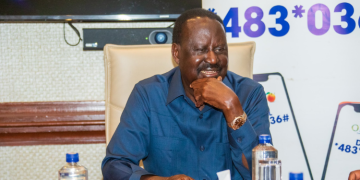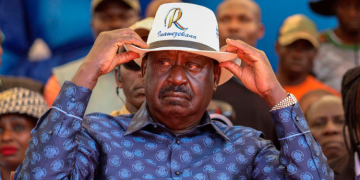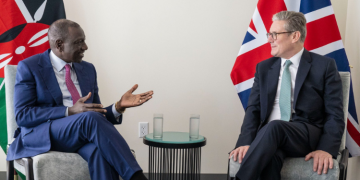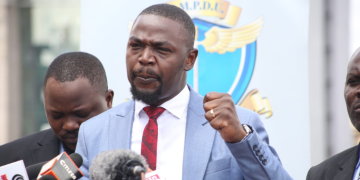The death of Professor Ngũgĩ wa Thiong’o on May 28, 2025, is not only a profound loss to the literary world but also a moment of reckoning for Kenya—a nation he devoted his life to awakening through literature, political activism, and personal sacrifice. In Ngũgĩ’s works such as Petals of Blood (1977) and Devil on the Cross (1980), he masterfully dissected the betrayal of Kenya’s post-independence dream and laid bare the state’s use of security forces to enforce political repression. Today, nearly five decades since those works were penned, Kenya remains trapped in the same cycle.
Ngũgĩ’s writing was never fiction for entertainment. He wrote to indict the system. His characters—Karega, Wanja, Muturi, and Wariinga live among us today in real life. They are the unemployed youth chased off Nairobi’s streets for protesting corruption and bad governance, they are activists tear-gassed for demanding justice. They are journalists arrested under the pretext of “national security.” They are also the victims of extra-judicial killings across the country.
Ngũgĩ’s critique carried damning truth: the state security apparatus—comprising of the police service, intelligence apparatus, and the military forces has historically been, and continues to be, a tool for the elite to maintain power. Instead of serving the people, these security apparatuses have been documented suppressing the very citizens they are meant to protect. This is not just a theme in his novels; it is the lived reality for millions.
Ngũgĩ wa Thiong’o’s Work, a mirror image of Kenya
For instance, In Petals of Blood, the post-independence Kenyan state unleashes its police on citizens who dare challenge injustice. Abdulla and Karega, symbols of resistance, are tortured without trial. The state uses its security forces to protect a class of economic exploiters of businessmen, Members of Parliament, and foreign investors while silencing dissent. The message is clear: challenging power is dangerous, especially when that power wears a uniform. Also
Also Read: Ruto Asks for Forgiveness from Tanzania and Uganda on Behalf of Kenyans
In Devil on the Cross, Ngũgĩ’s narrative turns even more dystopian. Ngugi, portrays a Kenya where leaders become agents of foreign capital, using the police and judiciary to eliminate voices like Wariinga’s and Wangari’s. These women, who embody resistance and truth, are brutalized, arrested, and silenced by police officers—black men serving black oppressors in a supposedly independent state. The state, through its police and military, unleashes terror on striking workers, housing protesters, and Mau Mau veterans alike.
This literary imagery mirrors our present-day Kenya. The security state has evolved but not largely transformed. In June 2024, we saw unarmed Gen Z led youth protesters met with live bullets for demanding better governance and rejecting oppression. Land activists in Lamu were arrested under terrorism laws. In 2025, whistleblowers still remain in hiding.
Whistleblowers can only feel safe calling out the government while in safe foreign havens. Case in study being the now global known Adani whistleblower Nelson Amenya who played a pivotal role while in France in stopping the Kenyan government from fraudulently leasing out the public Jomo Kenyatta international Airport – JKIA to a questionable private Indian firm Adani Group. The same script Ngũgĩ wrote in the 1970s plays on.
Not Yet Uhuru
The roots of this repression lie in the post-independence betrayal Ngũgĩ so often mourned. The dream of Uhuru became the nightmare of elite capture. Leaders once imprisoned for liberation struggles now occupy high offices and use the very same colonial-era tactics and structures to silence critics. The Special Branch has simply changed names. The police uniform is new, but the mission, “protecting power, not people”—remains.
Ngũgĩ’s genius was in showing that repression is not just physical; it is systemic. The absence of water in Ilmorog, the rundown schools, the broken hospitals—all enforced by a repressive economic system—were just as violent as police batons. And in portraying this, Ngũgĩ “the son of Murima” as he would today be referred as, forced readers to reckon with how deeply repression is embedded in governance itself.
His passing must therefore provoke not just mourning, but action
As Kenya’s political class mobilize to mourn Africa’s iconic writer, Kenya stands at a moral crossroads.
If we are to truly honour Ngũgĩ wa Thiong’o’s legacy, we must begin by reforming the very institutions he exposed. The police must be de-militarized and fully civilized.
The National Intelligence Service must be made accountable to the public, not just the presidency. The criminal justice system must cease being an accomplice to political interests.
As it is, reforms will not come from the top. They never have. Ngũgĩ reminded us that meaningful change comes from below—from teachers, students, peasants, workers, and artists who refuse to be silenced.
His own life story, imprisoned without trial at Kamiti Maximum Prison, forced into exile, writing from detention—tells us that truth-tellers will always face persecution. But it also tells us that their words endure, long after the guns fall silent.
The death of Professor Ngũgĩ wa Thiong’o MUST reignite our struggle. Let us no longer allow the security apparatus to be weaponized against its own people. Let us demand a Kenya where the police protect protestors, not shoot them. Where the courts serve justice, not politics. Where the uniformed man is no longer feared.
In the context of his writings, we have a long way to go but Ngũgĩ is gone. His fight lives on—in us. Lessons to draw from Africa’s iconic writer.
Follow our WhatsApp Channel and X Account for real-time news updates.











































































